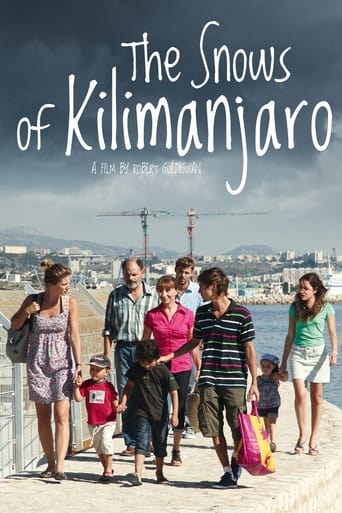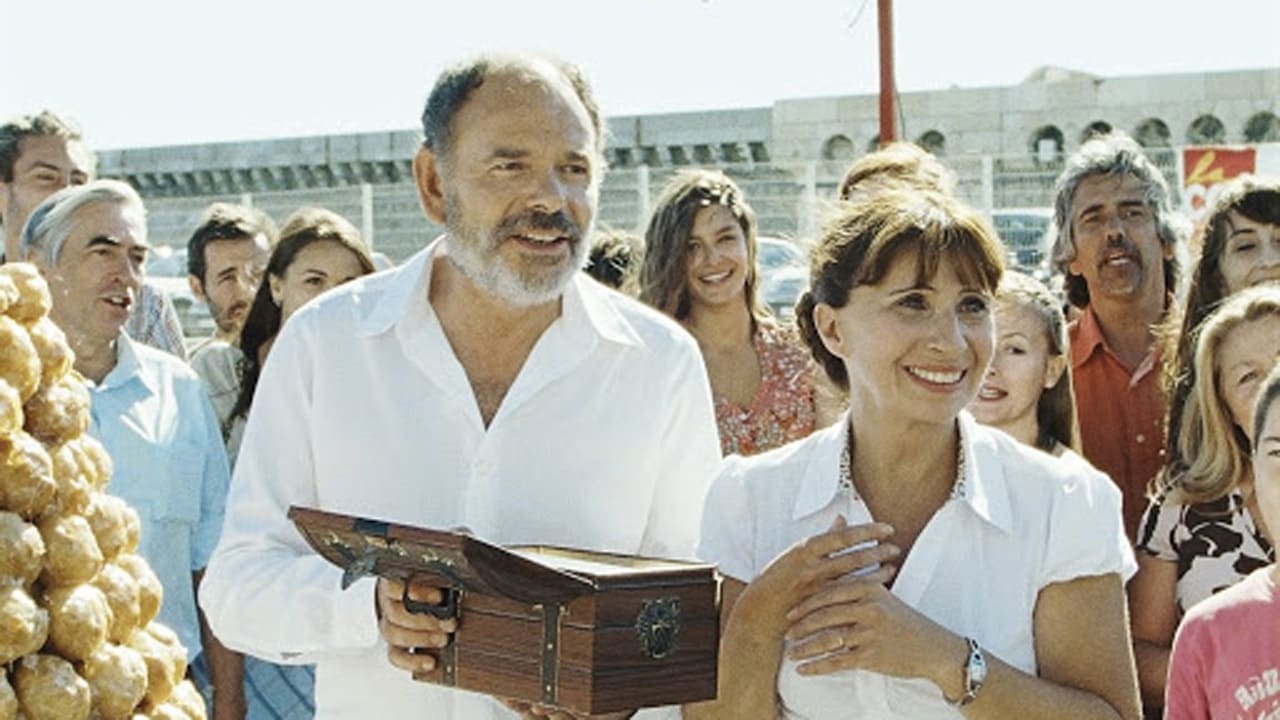dbdumonteil
look she said while opening the curtains,here they are ......"inspired by the poem by Victor Hugo "Les Pauvres Gens" " appears after the last picture ;This is one of my favorite poems ,an epic one which depicts the struggle of humble fishermen and their wives :Jeanie and her husband are poor and they live in a hut by the sea ;their neighbor ,a widow ,dies .Unbeknownst to their spouse,they both decide to take in the two orphans ."Nous Avions Cinq Enfants ,Cela Va En Faire Sept" (we had five children ,now it will make seven).Humble heroes in the shadow ,like Marie-Claire and her husband.And there was this old song ,one of the big hits of French Winter 1966-67, a wintry song by Pascal Danel ,who said he was inspired by Hemingway .This is really a memorable wonderful song which thoroughly deserved its success.And there was Darroussin and Ascaride ,both in a Cesar caliber performance ;the actress is absolutely sublime when they sing the song to celebrate their wedding anniversary ,a scene to rival the best of the classic cinema of Pagnol, Carné ,Duvivier or Grémillon ;I cannot think of another living actress whose face expresses compassion or true happiness as Miss Ascaride does .All her life ,she had to sacrifice her dearest dreams (becoming a nurse ,and now spending the Holiday of her lifetime ) and yet she says ,"I've always been happy" :so strong is her conviction that we do believe her .There's a stunning chemistry between her and Darroussin whose playing is miraculous too :an unionist whose illusions have gone,slowly by inexorably ,down the drain:but he remained true to himself ,true to Jean Jaurès,the great pacifist who was the first French victim of WW1;his "return good for evil" philosophy shows that sincere socialism (not the champagne socialists) and Jesus Christ's words (not the political Church)-without a single hint at religion in the film- come to the same conclusion ,Victor Hugo Guédiguian mentions at the end of his work was a Christian and a socialist .And there is Mr Guédiguian :we already knew ("La Ville est Tranquille " and other magnificent generous works) he was one of the greatest living directors in France ,along with Philippe Lioret ,with whom he shares the same sympathy for the human kind ;they show ,like Frank Capra and Frank Borzage in America before them ,that finer feelings may mean,when a clever director is in control, deeply moving efforts .No sex ,no violence (except for two short sequences )) ,no commercial dishonest compromise;as high as Kilimandjaro!
dromasca
The 20th century is over and the class wars also seem to be over, or at lease gone through a gradual but radical transformation. Communism may be dead in its Soviet variance, but the unions fights seem to have brought some results in Southern France where the action of 'Les neiges de Kilimandjaro' takes place in what concerns salaries, work conditions, pensions, retirement benefits. Even licensing is now done in agreement between employers and unions, sometimes by means of raffles. Michel, the hero of the film is a union leader, close but still before retirement age who is fired as the result of such a raffle. Yet the social safety net should avoid him a financial crash, and the family net extends the moral support. Michel, his family, his friends look more like an established bourgeois clan than like typical harbor proletarians. The family and friends even gather enough money to send the couple to a safari trip in Africa. All this until a violent robbery deprives them not only of the present, but also breaks into pieces the balance of their apparently accomplished lives, making them to face the realities of a world that does not always know, understand or care about the path and fights they went through in order to achieve the relative balance and happiness ati the older age.The story line told in a very classical linear manner focuses on the price people need to play to justify their happiness. It is not only about having worked and fought to achieve something, but also caring about the realities around. When the intrusion of violence risks to break the dream of their quite bourgeois retirement the response of the couple could also have been violence and rejection of the ignorance of the younger generations. The path taken by the script is however different, Michel and his wife Marie Claire will find in the goodness of their own selves the power to regain the true balance. The story does not avoid the risks of the melodrama, and the fact that it succeeds not to fall into cheapness is especially the result of good acting and low key directing.Director Robert Guediguian works with the same team of actors for quite a while, and this is felt in the natural way the actors move, act, interact. Jean-Pierre Darroussin and Ariane Ascaride are both wonderful, they carry the whole film on their shoulders and make real to the viewers two characters who in many other movies could have looked as too good to be real. Even the ideological lines drawn from texts by Victor Hugo or Jean Jaures are are well controlled and do not appear as too thick and obvious. Thanks to the directing style and fine acting 'Les neiges du Kilimandjaro' has a human touch and is a better film than it could have been.
Costas Papachristou
The question is simple but is far from being rhetorical: Should Art be an imitation of life, or should it be the other way around? The advocates of realism will surely make the first choice. In their view, life is full of ugliness that Art must faithfully portray, with absolutely no recourse to artificial embellishments. Often, the artist cannot even see the difference between realism and pessimism. In the case of cinema, in particular, the audience must leave the theater filled with dark thoughts and feelings of vanity. Happy ending is a taboo, and the positive message is hard to find (since life itself doesn't support it). On the opposite side of realism, idealism reserves a more noble and ambitious role for Art; namely, to create high standards of thinking and behavior, thus offering psychological, ideological and aesthetic motivation for man to overcome the inherent weaknesses of his/her nature and reach these standards. Robert Guédiguian's wonderful movie "The Snows of Kilimanjaro" (France, 2011) masterfully balances between these two opposite philosophical trends. On the one hand, there are the hard realities of our time: the economic recession and consequent unemployment, the growing youth resorting to crime, the refutation of the visions of the Left, and the (non-glorious) compromise of the latter with modern neoliberalism where there is no social care for the weak. On the other hand –and these are the elements progressively dominating the film up to the final catharsis- scenes of incredible beauty parade through the eyes of the viewer, exhibiting a triumph of friendship, humanity, forgiveness, solidarity (a worthy substitute for absent state care)... And, above all, love and togetherness that keep a marriage alive over time and against the difficult challenges of life! We left the theater full of positive thoughts and feelings. Finally leaving behind the painful memories of sickening movies by Michael Haneke or the Coen brothers...
Ruben Mooijman
A few years ago, I read the novel 'How to be good' by Nick Hornby. As the title suggests, this wonderful book is about being good, and about the problems connected with being good. Les Neiges du Kilimandjaro reminded me of this book, because the film is also about being good. Michel is a blue collar worker at a company in the port of Marseille, and takes pride in his 'being good'. He has always tried to be a responsible citizen, and is one of the union representatives in his company. When the company has to lay off twenty workers, Michel proposes to organize a lottery and puts his own name on the list, although as a union man he is not obliged to. Michel loses his job, and soon afterward gets robbed in his own house. By coincidence, he learns the identity of the criminals, and they are arrested. The events connected with the robbery make him doubt his own 'goodness'. A confrontation with one of the robbers puts everything he thought to know in a different perspective: Michel recognizes that he has become 'bourgeois'. His supposed 'goodness' turns out quite differently than he thought. This charming movie turns things upside down and asks interesting questions, but doesn't give clear cut answers. Michel is 'good', but not as good as he thought. And the thief is 'bad', but not as bas as it seems. The story zigzags nicely between the moral dilemmas, and never becomes heavy-handed. The overall tone is upbeat, and especially the end scenes are almost heartbreakingly optimistic. Director Guédiguian has made a film about ordinary people in their daily lives, and shows us that those lives can be very interesting. Would it be exaggerated to call him the French Mike Leigh?PS Don't let yourself be put off by the title. The movie never leaves sunny Marseille. The title is merely a reference to a very well-known French song.


 AD
AD



